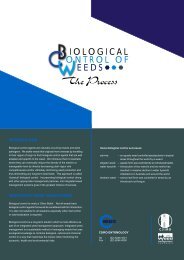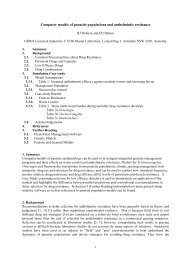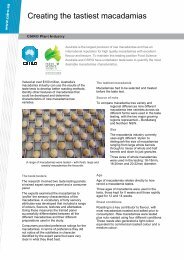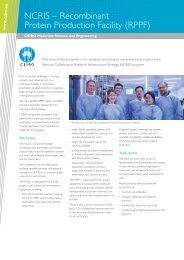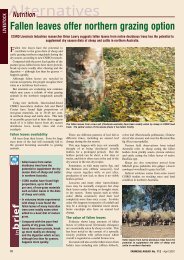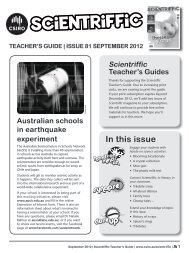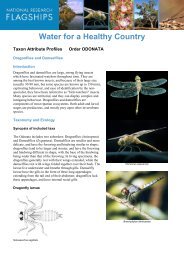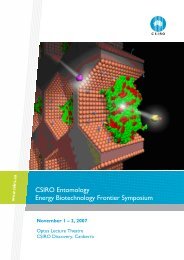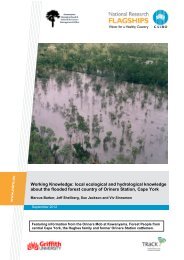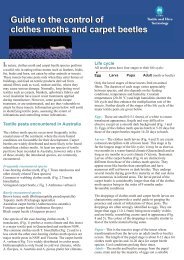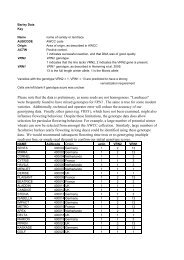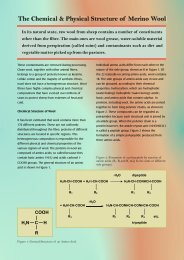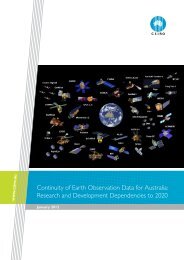The CSIRO Total Wellbeing Diet Frequently Asked Questions
The CSIRO Total Wellbeing Diet Frequently Asked Questions
The CSIRO Total Wellbeing Diet Frequently Asked Questions
Create successful ePaper yourself
Turn your PDF publications into a flip-book with our unique Google optimized e-Paper software.
TWD_FAQs_June2008.doc <strong>CSIRO</strong> Human Nutrition<br />
Cost of food in the TWD<br />
One option would be to buy cheaper cuts of meat. Lean mince is fine as well as cuts that need more cooking time<br />
such as chuck steak for stews and slow-cooked casseroles. Some meals can be cooked in bulk on the weekend and<br />
frozen in batches (see also: Freezing Food). Quite often they taste better as well. Try to shop for what is seasonally<br />
available particularly in the fruit and vegetable lines as this is most cost-effective. Remember that the eating plans<br />
are meant as a guide only and can be varied as long as you choose alternatives from the same food groups.<br />
Probably one of the most expensive items is the fish. Choose less expensive fish varieties as well as canned fish as<br />
options.<br />
A less expensive lunchtime option is to have 50g protein food plus one dairy serve ( eg; low-fat cheese) or two eggs.<br />
For dinner try using smaller portions of animal protein (eg; 100g meat/chicken/fish) then adding vegetable protein<br />
(eg; 130g beans (cooked weight) or 100g tofu).<br />
How can I reduce my food bill?<br />
Shop for seasonally available foods (fruit and vegetables) and use cheaper cuts of meat, such as chuck steak for<br />
stews. Choose less expensive fish varieties, use eggs as a replacement protein for one protein-unit, add lentils in<br />
place of some portions of meat at dinner (see B2-page 34).<br />
Dairy and non-dairy<br />
Soy milks can be used as a substitute for cow’s milk & low lactose milk drinks for those with lactose intolerance. If<br />
you need to substitute soy products for dairy, then please apply limits and similar quantities as per the Dairy Foods<br />
list below (this is assuming that similar protein/calcium and other nutrient levels are similar to low fat dairy products).<br />
You may use soy or other high calcium foods as substitutes:<br />
DAIRY (2-3 serves per day) 1 serve of dairy equals = low-fat or diet yoghurt; or dairy dessert, 200g; or low-fat milk,<br />
250ml or 25g cheddar cheese or other full fat cheese, or 50g reduced-fat cheese (10% fat).<br />
• Book 2 recommends 3 units of dairy per day.<br />
• the 50g protein food for lunch can be substituted for an extra dairy serve<br />
Diabetes – Is the diet appropriate for people with diabetes?<br />
People with diabetes should check with their doctor, dietician or specialist to make sure that it is appropriate for<br />
them. <strong>CSIRO</strong> Human Nutrition response: “While we cannot make recommendations for which diet people should<br />
choose to use, nor give advice about weight loss or treatment for medical conditions, the book covers some<br />
questions about type 2 diabetes (see B1 - page 20 or B2 – page 33).<br />
As always any diet plans are guidelines only and are not intended as medical or nutritional advice. For specific<br />
health or dietary concerns we recommend discussing this with your doctor or dietician.”<br />
For more information about Diabetes, please contact your local branch or the national branch of Diabetes Australia.<br />
http://www.diabetesaustralia.com.au/home/index.htm<br />
<strong>Diet</strong> checklists (B1 - page 195 or B2 – pages 214-215)<br />
<strong>Diet</strong> soups (low-kilojoule)<br />
Low-joule soups (250ml/day) are good snacks and are an optional extra each day. Any packet soups containing less<br />
than approx 160 kilojoules per serve are suitable once a day. Another option is to make your own vegetable soup<br />
using vegetables from the ‘free’ list.<br />
<strong>Diet</strong>ary advice about personal health/medical conditions<br />
Regrettably, we do not have the resources to provide individual dietary advice. While <strong>CSIRO</strong> Human Nutrition is able<br />
to provide some general nutrition information, it is beyond their scope to provide answers to personal health<br />
problems or medical conditions. As stated in the TWD book “<strong>The</strong> information contained in this book is not intended<br />
as a substitute for consulting with your physician or other health care provider.”<br />
Drinks / Coffee – You can swap a low-fat coffee beverage for any other similar drink (eg. tea with low-fat milk). <strong>The</strong><br />
free list (B1 - page 23 or B2 – page 9) also lists cocoa and herbal tea as hot drinks.<br />
Editions of the TWD book<br />
<strong>The</strong> <strong>CSIRO</strong> <strong>Total</strong> <strong>Wellbeing</strong> <strong>Diet</strong> has been available since August 2003. Its first release was as a free booklet in the<br />
Australian Woman’s Weekly, followed by an A5 sized booklet plus a number of weekly menus. <strong>The</strong> complete and<br />
first edition of the book came in May 2005 and a number of overseas editions (see also: International Rights). <strong>The</strong>re<br />
6



